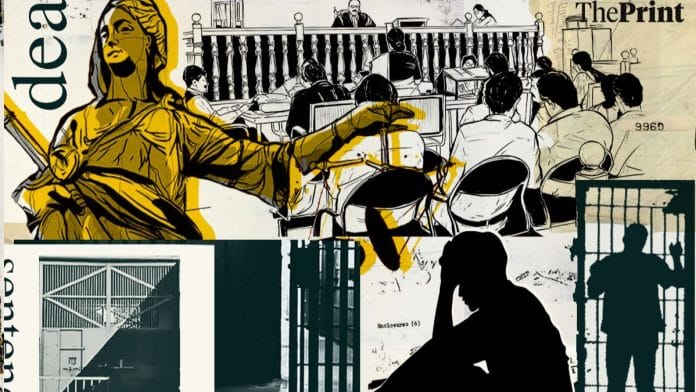New Delhi: Ten convicts from Jharkhand, including six who are on death row, have moved the Supreme Court, complaining against the delayed disposal of their appeals by the state HC.
According to the petition, jointly filed by the convicts, verdicts in eight cases were reserved more than three years ago. Judgments in the remaining two have not been pronounced despite a lapse of 2-3 years.
Monday, a bench led by Justice Surya Kant took serious note of the petition and issued a notice to the Jharkhand HC for its response.
The petition raises important questions regarding convicts’ rights to personal liberty and procedural fairness under the criminal justice system. It argues that convicts too have the right to live with dignity under the Constitution. Prolonged delay in disposal of their appeals is antithetical to Constitutional as well as statutory rights.
Incidentally, this is the second time that convicts from Jharkhand have sought the top court’s intervention in pending verdicts on their appeals filed against trial court decisions.
In the previous round, four convicts had filed writ petitions under Article 32—a remedy under the Constitution to move the top court directly for enforcement of a fundamental right. Subsequent to the apex court’s notice, the HC had delivered its verdict for all four, resulting in acquittal in three cases. In the fourth case, the HC had referred the case to a third judge due to a difference of opinion between the two judges. Nonetheless, the convict in the fourth case was released on bail immediately.
Taking note of the inordinate delay on the part of the state HC, Justice Kant’s bench had asked its registrar general for a detailed report on the status of such cases, if any.
Notably, all the 14 cases that have reached the top court were heard by a division bench of two judges. As per the Jharkhand HC website, Justice Rongon Mukopadhyay led the two-judges bench that heard and then reserved the verdict in these matters. Only the junior judges were different. Justice Mukopadhyay also heads the High Court Services Legal Committee—a legal aid body that provides free legal services to marginalised sections of the society.
Three of six death row convicts, who filed their appeals in the HC in 2018, are facing death sentence in rape cases.
One of the 10 petitioners has been in jail for more than 16 years and had filed his appeal in the HC in 2013. Six have been in jail for more than a decade, with two having spent more than 15 years behind bars. The remaining three have been in jail for 6 to 8 years now.
The petitioners, who moved their petition through the Supreme Court Legal Services Committee (SCLSC), were represented in the top court by advocate Fauzia Shakil.
Before moving the SC, the petitioners and their families repeatedly raised the issue of delayed verdicts with multiple authorities, including the Chief Justice of the HC. They also wrote to the Chief Minister’s office and legal aid bodies such as NALSA, state as well as district legal services authority.
The delay is not just a procedural violation, but a breach of a statutory mandate too. The petition pointed out that as per the Jharkhand HC rules, a judgment should ordinarily be pronounced within six weeks of the conclusion of arguments.
If not pronounced within three months of the conclusion of the arguments, the Chief Justice may either post the case for delivering the judgment in an open court or withdraw and post it for disposal before an appropriate bench.
In terms of the statutory mandate, the rape appeals ought to have been disposed of within six months of the filing of the appeal. Under the Criminal Law (Amendment Act), 2018, which came into effect on 21 April 2018, with the insertion of sub-section (4) in section 376 of the erstwhile Criminal Procedure Code (CrPc), an appeal filed against the sentence imposed under the rape law must be disposed of within six months from the date of filing of an appeal.
The petition is also an attempt to seek correction of earlier Supreme Court judgments that have given relief to death row convicts only when there is delay on the part of the President or Governor in deciding mercy petitions, observing inordinate delay in the execution of death sentence causes mentally agony.
Ironically, these judgments have excluded the impact of protracted delays in judicial proceedings, such as confirmation of death sentences or adjudication of criminal appeals, on a convict’s mental health and dignity.
Courts have criticised the executives—President and Governor—for their inexplicable delay in deciding mercy petitions of death row convicts while commuting them to life sentences, but have refrained from taking into account the judicial impasse that has forced prisoners to remain incarcerated for prolonged periods.
Rather, judicial decisions have held that a convict is not under immediate threat of execution when his/her appeal is a subject of judicial consideration, meaning pendency of their case in a court does not affect them psychologically.
“It is further submitted that mere availability of judicial remedies does not eliminate the mental anguish; in fact, protracted delays in judicial proceedings exacerbate the suffering, as the convict is kept in a state of suspended animation—neither assured of life nor facing immediate execution,” the petition has submitted.
“It is respectfully submitted that the pendency of death sentence confirmation hearings or criminal appeals, particularly in cases involving capital punishment, is not a period of calm or relief. Rather, it is a period of uncertainty and anxiety. The convict remains incarcerated under the shadow of a potential execution despite the existence of legal remedies,” it added.
Delay in pronouncement of judgments is not just a violation of the right under Article 21, but is a crucial factor for suspension of the sentence, the petition has argued.
(Edited by Viny Mishra)
Also read: Why Supreme Court hasn’t confirmed a single death sentence in the last two years






